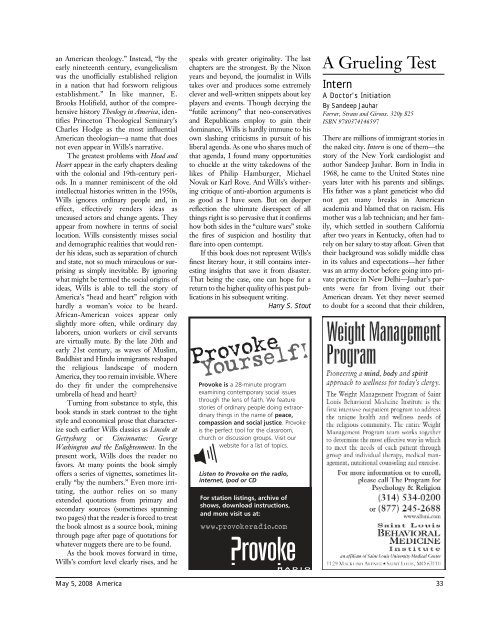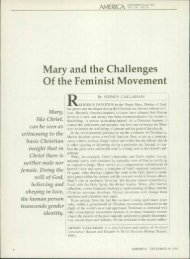Download PDF - America
Download PDF - America
Download PDF - America
Create successful ePaper yourself
Turn your PDF publications into a flip-book with our unique Google optimized e-Paper software.
an <strong>America</strong>n theology.” Instead, “by theearly nineteenth century, evangelicalismwas the unofficially established religionin a nation that had forsworn religiousestablishment.” In like manner, E.Brooks Holifield, author of the comprehensivehistory Theology in <strong>America</strong>, identifiesPrinceton Theological Seminary’sCharles Hodge as the most influential<strong>America</strong>n theologian—a name that doesnot even appear in Wills’s narrative.The greatest problems with Head andHeart appear in the early chapters dealingwith the colonial and 19th-century periods.In a manner reminiscent of the oldintellectual histories written in the 1950s,Wills ignores ordinary people and, ineffect, effectively renders ideas asuncaused actors and change agents. Theyappear from nowhere in terms of sociallocation. Wills consistently misses socialand demographic realities that would renderhis ideas, such as separation of churchand state, not so much miraculous or surprisingas simply inevitable. By ignoringwhat might be termed the social origins ofideas, Wills is able to tell the story of<strong>America</strong>’s “head and heart” religion withhardly a woman’s voice to be heard.African-<strong>America</strong>n voices appear onlyslightly more often, while ordinary daylaborers, union workers or civil servantsare virtually mute. By the late 20th andearly 21st century, as waves of Muslim,Buddhist and Hindu immigrants reshapedthe religious landscape of modern<strong>America</strong>, they too remain invisible. Wheredo they fit under the comprehensiveumbrella of head and heart?Turning from substance to style, thisbook stands in stark contrast to the tightstyle and economical prose that characterizesuch earlier Wills classics as Lincoln atGettysburg or Cincinnatus: GeorgeWashington and the Enlightenment. In thepresent work, Wills does the reader nofavors. At many points the book simplyoffers a series of vignettes, sometimes literally“by the numbers.” Even more irritating,the author relies on so manyextended quotations from primary andsecondary sources (sometimes spanningtwo pages) that the reader is forced to treatthe book almost as a source book, miningthrough page after page of quotations forwhatever nuggets there are to be found.As the book moves forward in time,Wills’s comfort level clearly rises, and hespeaks with greater originality. The lastchapters are the strongest. By the Nixonyears and beyond, the journalist in Willstakes over and produces some extremelyclever and well-written snippets about keyplayers and events. Though decrying the“futile acrimony” that neo-conservativesand Republicans employ to gain theirdominance, Wills is hardly immune to hisown slashing criticisms in pursuit of hisliberal agenda. As one who shares much ofthat agenda, I found many opportunitiesto chuckle at the witty takedowns of thelikes of Philip Hamburger, MichaelNovak or Karl Rove. And Wills’s witheringcritique of anti-abortion arguments isas good as I have seen. But on deeperreflection the ultimate disrespect of allthings right is so pervasive that it confirmshow both sides in the “culture wars” stokethe fires of suspicion and hostility thatflare into open contempt.If this book does not represent Wills’sfinest literary hour, it still contains interestinginsights that save it from disaster.That being the case, one can hope for areturn to the higher quality of his past publicationsin his subsequent writing.Harry S. Stout A Grueling TestInternA Doctor's InitiationBy Sandeep JauharFarrar, Straus and Giroux. 320p $25ISBN 9780374146597There are millions of immigrant stories inthe naked city. Intern is one of them—thestory of the New York cardiologist andauthor Sandeep Jauhar. Born in India in1968, he came to the United States nineyears later with his parents and siblings.His father was a plant geneticist who didnot get many breaks in <strong>America</strong>nacademia and blamed that on racism. Hismother was a lab technician; and her family,which settled in southern Californiaafter two years in Kentucky, often had torely on her salary to stay afloat. Given thattheir background was solidly middle classin its values and expectations—her fatherwas an army doctor before going into privatepractice in New Delhi—Jauhar’s parentswere far from living out their<strong>America</strong>n dream. Yet they never seemedto doubt for a second that their children,May 5, 2008 <strong>America</strong> 33









